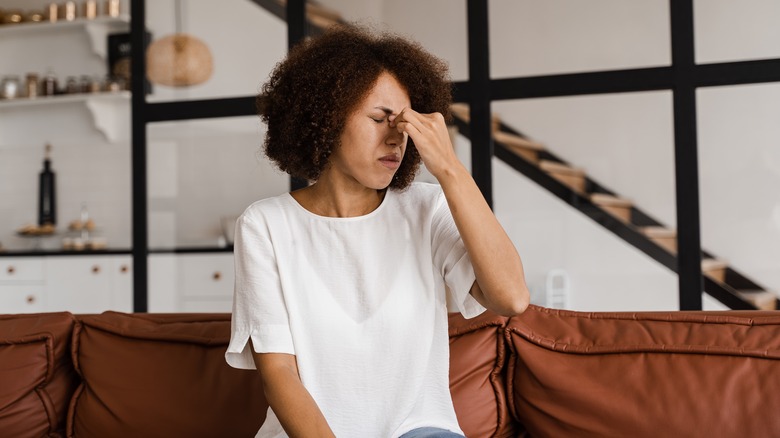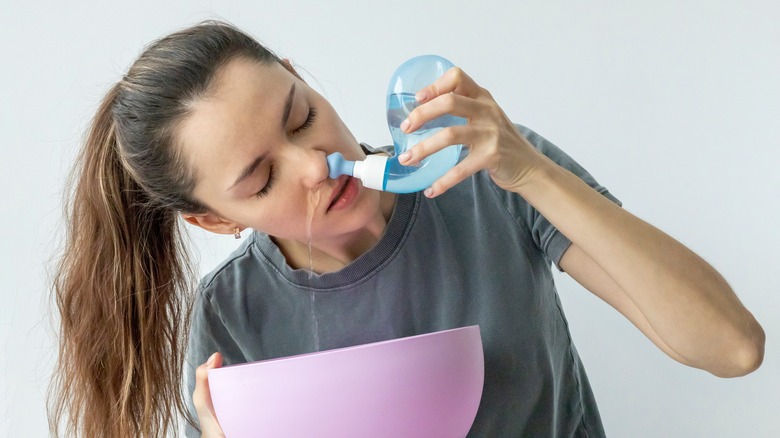How To Ease Sinus Headache Pain At Home
If you develop a sinus headache, you tend to know it right away because you can feel it on your face, from your nose to your forehead (via Cleveland Clinic). It can also be accompanied by a fever, stuffy nose, or a discharge of thick mucus from the nose. Some people can feel as though sinus headaches can also be caused by allergies or migraines. However, while allergies can be responsible for the congestion, which, in turn, can cause sinus pain, they are not directly responsible for sinus headaches. Similarly, migraines can cause sinus pain, but true sinus headaches are the result of infection.
According to Medical News Today, sinus headaches develop when the membrane that lines the sinuses becomes inflamed, creating pressure and subsequent discomfort. Headaches can also develop when infection leads to a buildup of fluid in the sinuses. The infection itself is triggered by excessive mucus in the sinuses. Whether it's from a cold, allergies, or even a deviated septum, a profusion of mucus in the sinuses leads to the formation of germs and, in time, infection, the Cleveland Clinic notes.
Flushing out the sinuses can be beneficial
With treatment at home, a sinus infection, or sinusitis will usually last a week to 10 days, according to AllinaHealth. Luckily, you can manage the pressure of sinusitis in a number of ways, including flushing out the nasal passages with a Neti pot or using an over-the-counter nasal spray. Keep in mind that some sprays, such as Afrin, can only be used for a short period of time. Overuse can lead to what is known as rebound congestion, which can block you up even more.
In addition to nasal irrigation and sprays, GoodRx Health notes that there is an FDA-approved over-the-counter method for treating sinus pain called ClearUP, which clears congestion via electrical stimulation. A person can run this device over their forehead, nose, and cheeks to help ease some of the symptoms. Plus, according to Healthline, you can use such at-home treatments as steam to help thin the mucus and create moisture in the nasal passages. You can also take a bath with eucalyptus oil, which contains cineole that aids in the healing process of sinusitis.
Locate where your headache is coming from
Aside from medications and at-home treatments, the experts at Healthline advise to not discount the value of a good night's sleep. When you are sleeping, hormones are released that aid in the growth of healthy tissue. In addition, sleep gives your body time to produce white blood cells, which can fight off and drive out bacteria and infections. Therefore, try and sleep in an elevated position, keeping your head above your heart in order to keep sinus buildup at bay and alleviate pressure on the area.
For long-term relief, it's best to figure out what the actual cause of your headache is, according to the Cleveland Clinic. In other words, what you may think are sinus headaches could actually be migraines. That being said, if you are experiencing chronic headaches, particularly migraines, you should try keeping a headache diary and avoiding certain triggers, such as caffeine, alcohol, and stress. Most importantly, you should consult with your doctor about your headaches to determine whether or not they are caused by your sinuses or another condition entirely. Helping to get to the root of your headaches is the first step toward getting them under control.



